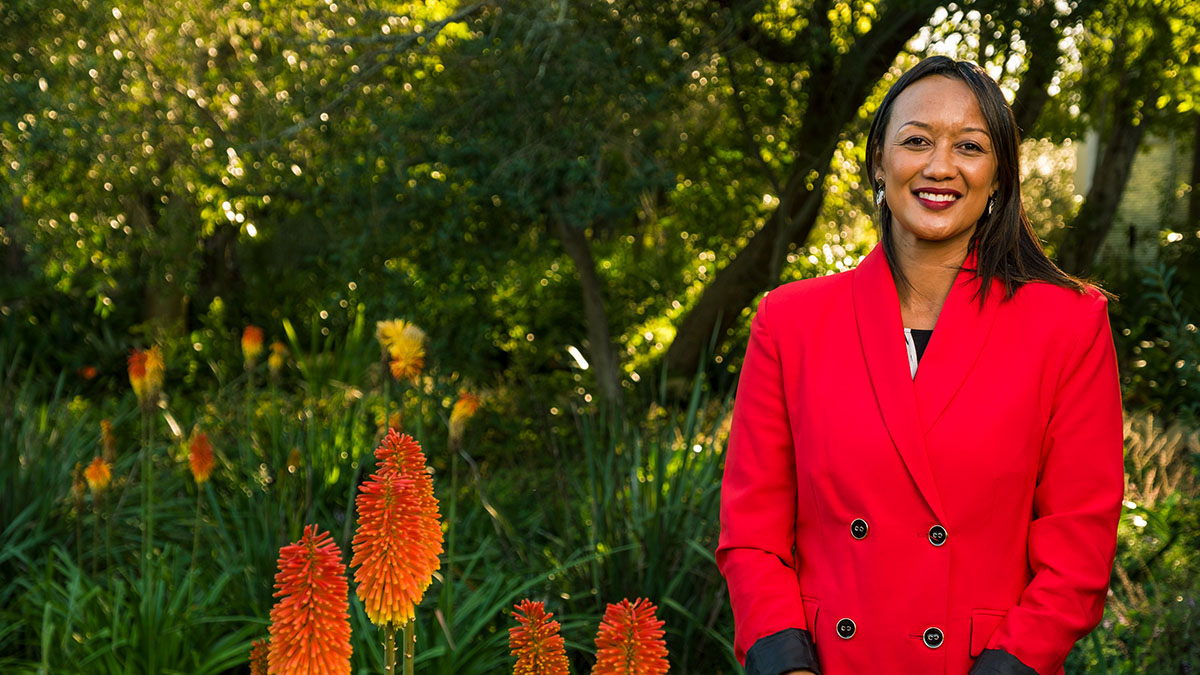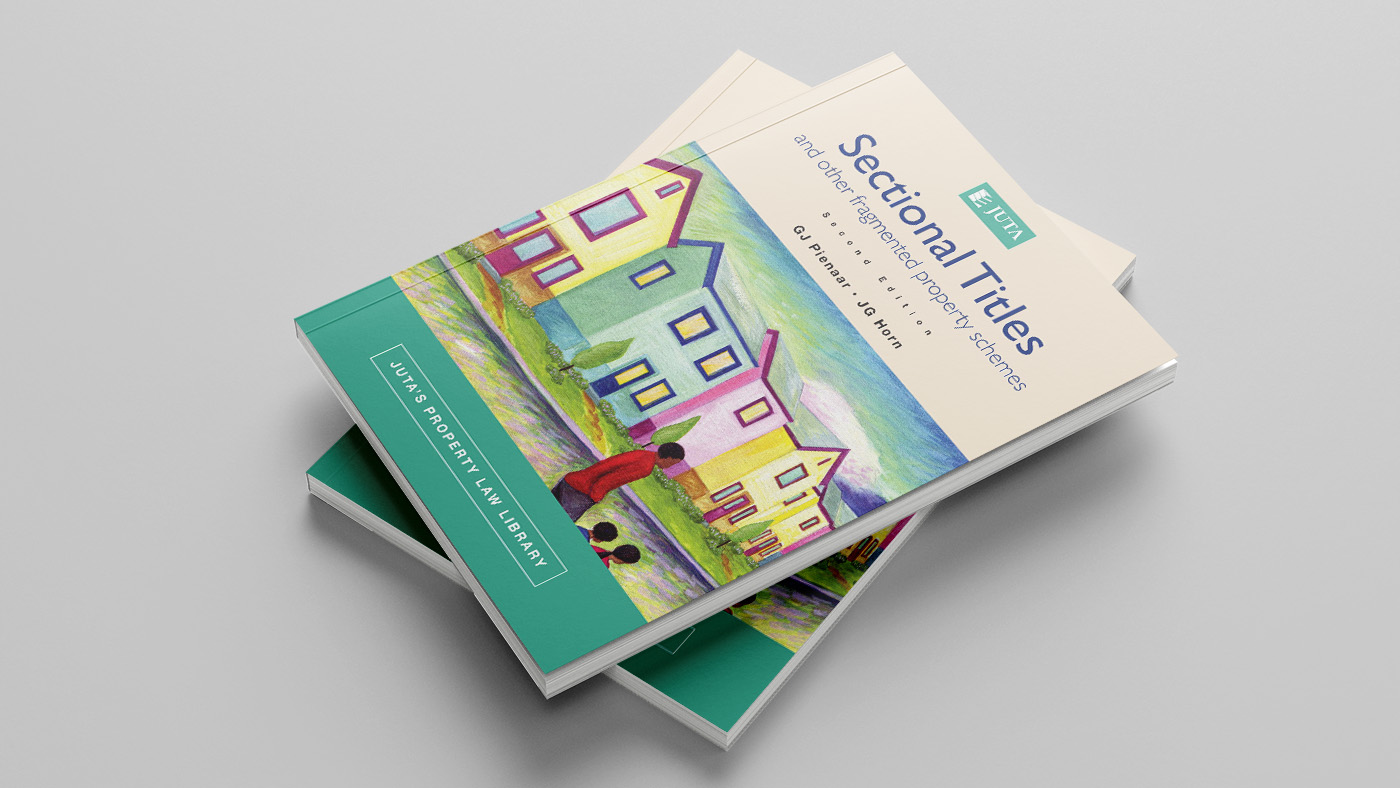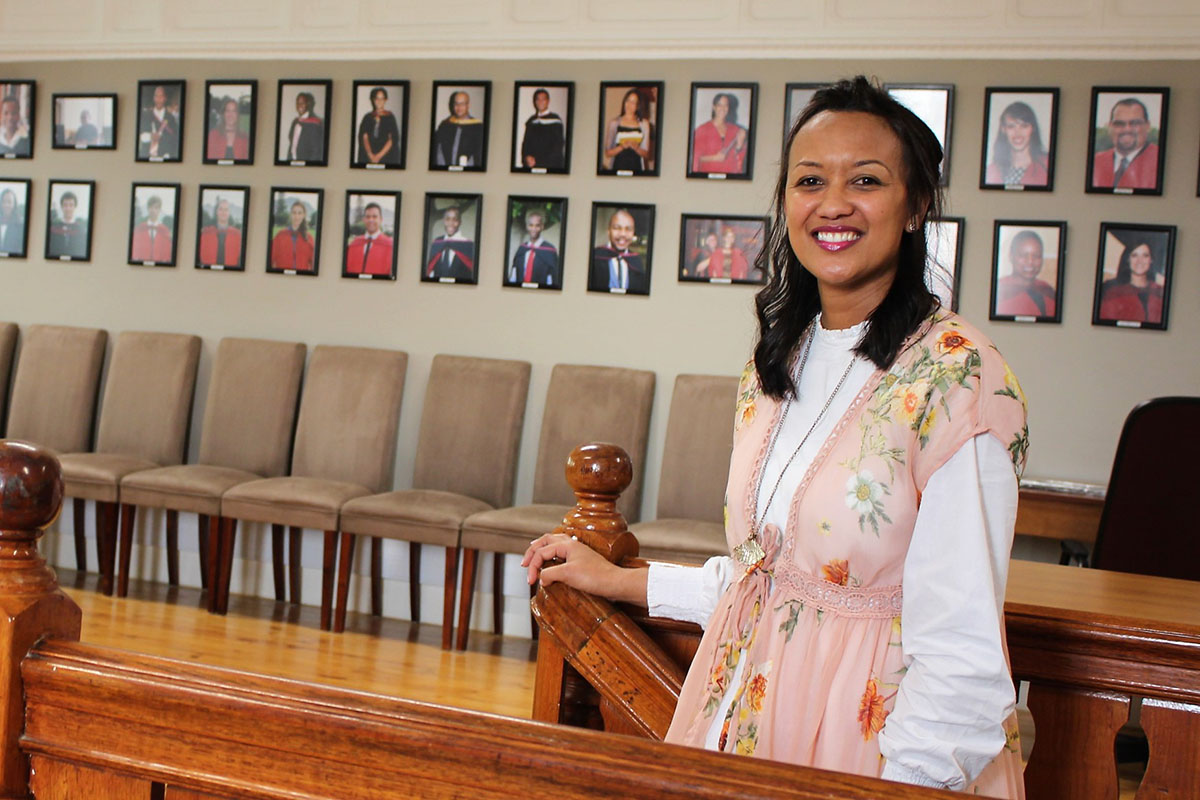Chair lay property law foundation for democratic SA
Engela Duvenage

Prof Zsa-Zsa Boggenpoel specialises in property law, constitutional property law, and property theory. She was awarded an NRF C1-rating in December 2022, which recognises her as an established researcher in her field. | Photo by Stefan Els

Stellenbosch University currently hosts 50 research chairs, 20 of which form part of the South African Research Chairs Initiative (SARChI), funded by the Department of Science and Innovation (DSI), through the National Research Foundation (NRF).
A series of monographs in pastel-coloured covers have pride of place in Prof Zsa-Zsa Boggenpoel’s office in the Old Main Building, traditionally the hub of Stellenbosch University’s (SU’s) Faculty of Law. Each tackles an aspect of property law, from the rights of landlords and tenants to how the law pertains to neighbours, planning, servitudes, remedies, and the minerals and petroleum sector. These monographs stand testament to the endeavours of the South African Research Chair in Property Law (SARCPL) and the collaboration between its academics, students, fellows, and research contributors towards interpreting and analysing property rights in the new constitutional dispensation.
The Chair was part of the national Department of Science and Technology’s South African Research Chairs Initiative (SARChI), and based at SU between 2008 and 2022.
Some of the monographs were authored or edited by either Boggenpoel (who served as Chair between 2018 and 2022) or the late Prof André van der Walt (Chair between 2008 and 2016). Prof Gerrit Pienaar from the North-West University and Prof Juanita Pienaar of SU also provided extensive editing support on these volumes.
Others were penned by leading South African legal minds associated with the SARCPL. All are part of JUTA’s South African Property Law Library. The volumes on planning law and constitutional property law are already in their third edition, and the one on sectional titles and other fragmented property schemes is enjoying a second. The series is ongoing, with the latest volume published at the end of 2023 in honour of Prof Gerrit Pienaar’s scholarship.
The books include the uncodified common law that is mostly embodied in case law and academic writing, but also contain analyses of Section 25 of the South African Constitution. According to Boggenpoel, the series shows how property laws influenced during apartheid can be redeveloped into tools that help transform South African law and society, and benefit its citizens.

The Chair has been involved in developing sectional titles and other fragmented property schemes.
Tackling expropriation without compensation
A recent addition to Boggenpoel’s bookshelf is Beyond expropriation without compensation: Law, land reform and redistribution justice in South Africa, published in early 2024 by Cambridge University Press. The 336-page volume takes into account various disciplines’ input on the often heated legal and political-policy debates around land reform. According to its publishers, the book “brings debates around transformative property law, the need for diversified land justice, and the possibilities of alternative forms of redistribution into productive conversation with each other”.
Boggenpoel served as co-editor of the book, supporting anthropologist Prof Olaf Zenker of the Martin Luther University Halle-Wittenberg in Germany and sociologist Prof Cherryl Walker of SU.
The groundwork for this publication was laid by research outputs from the Chair, which provided a valuable platform for current debates and research publications around the topic of expropriation without compensation.
More progressive reading of the law needed
Boggenpoel is a C1-rated researcher who has written widely on topics such as transformation, law, justice, and compensation for expropriation.
She believes that a more progressive reading of the law could solve many of South Africa’s challenges around a more equitable distribution of land rights.
“I try to think of ways in which we can be more progressive in protecting marginalised groups, for instance. I want to unlock possibilities that have not been opened before. The law has the potential to do that, but we need to be more creative in the way that we see things. The law is not as rigid as many people think it is. Daily, we see how courts are stretching it,” she says.
“Research done under the auspices of the Chair showed quite strongly that the proper place of property law in the constitutional democracy can only be determined, and developed, through a systemic approach that, at its core, takes its cue from the Constitution.”
As one of the SARCPL’s first postgraduate students, Boggenpoel began testing her ideas in a doctoral dissertation about building encroachments and the compulsory transfer of ownership in light of the constitutional requirement that landowners not be arbitrarily deprived of property. She obtained her doctorate in 2010. In 2018, at the age of only 32, she was appointed as a SU professor in private law and as the SARCPL Chair, after being interim Chair following Van der Walt’s death in 2016. The position allowed her to supervise and mentor students who too wanted to help shift legal boundaries — an endeavour she began when she was first appointed as lecturer in private law at SU in 2011.
Highly skilled scholars
Boggenpoel reckons that one of the SARCPL’s most significant research contributions centres around the principle of a single system of law.
“This principle essentially drives the idea of a new theoretical foundation in property law, inspired by the Constitution,” she explains. “Its implications for the place and function of property law in the legal system were foundational to the Chair’s research. But more work remains to be done in this area, even after the Chair has ended.”
The development of the Chair and, as such, that of the principle of a single system of law helped shape a new cohort of legal thinkers, with up to three alumni appointed to South African law faculties in certain years. Many of these appointments went a long way towards diversifying institutions’ academic corps. Some of these alumni have since also begun their own research groups.
The research chair was among others initiated to address a shortage in highly skilled law scholars who can drive transformation in property law. It clearly hit its mark — by 2024, 19 of its alumni are teaching at local universities, while others are working as attorneys, advocates, senior associates, researchers, or legal advisors in government departments.
Boggenpoel is heartened by this as she still fondly remembers some of the discussions around alumni’s employment options that she, as a student, had with the late Van der Walt. Her inspiring mentor and A1-rated colleague’s vision was to “not train people for and in academia only,” she remembers.
Students of the Chair received training throughout their degrees on generic research topics such as how to plan and write up research projects, reading and citation skills, and the ethics of citation. The Chair provided a platform for students and researchers to collaborate with international colleagues, present workshops and law seminars to the legal fraternity, and attend international conferences.
“The broader training provided enabled alumni to teach an array of subjects, not only property law. They also did research in other fields within a transformative framework and regarding the single-system-of-law principle,” Boggenpoel notes.

Boggenpoel considers property ownership “a gateway to emancipation and many freedoms”. | Photo by Engela Duvenhage
A range of topics
The research outputs that alumni and staff of the erstwhile Chair have since published in accredited law journals and books are “visible and marked, and have expounded on the implications of this principle and how it applies in terms of Section 25 of the Constitution,” she says.
Boggenpoel views property ownership as “a gateway to emancipation and many freedoms”. It entails more than just a roof over someone’s head. The denial of property rights is fraught with controversy and strife, as is evident from the ongoing debates about the equal distribution of land and unlawful land occupation.
Over the course of its lifetime, the Chair’s 15 LLM and 22 LLD graduates tackled a wide range of topics —- from the historical bases of land claims, public nuisance issues, the deprivation of property, appropriate eviction remedies, access rights that limit landowners’ right to exclude, and tenure security to the meaning of “public purpose” and “public interest” in the Constitution. One student deliberated the minimum standards that people can legally expect from housing provided to them, while another considered whether inhabitants are adequately consulted when informal settlements are relocated.
The Chair produced its first PhD students in 2009. At the time, Prof Danie Brand, currently at the University of the Free State and director of its Free State Centre for Human Rights, wrote a dissertation titled ‘Courts, socioeconomic rights and transformative politics’. Prof Elmien du Plessis, now at the University of Pretoria, tackled the issue of compensation for expropriation under the Constitution. In 2022, Dr Giséle Chloé Lavita was the Chair’s last LLD student to graduate. She focused on property law perspectives on the regulation of the Airbnb industry and is now pursuing further postgraduate studies in Spain.
Finding new, fair solutions
“Many of our students thought about approaches that are favourable to both the landowner and unlawful occupiers,” Boggenpoel says. “It’s not so much about how the existing law should change, but often about how to balance two constitutional rights against each other to reach a solution that is equitable and makes practical sense. For instance, issuing fines to homeless unlawful occupants will not work because they do not necessarily have the money to pay those fines.
“Some options might have worked many years ago when we lived in a different society with different rules. There is always a ‘but’ involved. Fleshing out that ‘but’ with qualifications provides a new position.
“However, that’s often very difficult for people to grasp and to accept,” she admits. “Some students have surprised me in terms of how novel they can think, how innovative they are in the examples they come up with. I often think that I would never have been able to take on a specific project or come up with a particular suggestion [as they have].
“The beauty of the Chair is that many of our students are now leaders in their respective places of occupation.”
“There is still so much more to do in terms of property law, and we all need to do more collectively,” she adds. “The Chair was novel for the time in which it was created. It started something that I think needs to continue. We therefore keep research seminars and reading groups going and have started new ones.”
Taking it forward
The SARCPL’s work officially concluded in December 2022 with a conference held under the theme of ‘Transforming Property Law — 15 Years in the Making’.
Related research work continues, albeit not in the official ambit of a research chair. In a 2023 paper in the South African Law Journal, Boggenpoel argued that women are still in a vulnerable position regarding land rights, despite a constitutional and legislative framework that purports to be progressive in terms of gender equality and advancing women’s land rights.
“The article challenges the belief that individual wins in some court judgements are enough to proclaim the strengthening of women’s land rights,” she reflects.
In a paper published in the Potchefstroom Electronic Law Journal in 2024, Boggenpoel and Dr Sameera Mahomedy (who received her LLD in 2021 and is now a researcher at the University of the Witwatersrand) reflected on some of the unresolved issues surrounding evictions and unlawful land occupation.
“There is arguably no better place to see a property law system’s ideology playing out than in the context of the eviction of an unlawful occupier,” they write.
Their point is this: “While our approach to evictions and unlawful occupation has clearly shifted from a draconian approach under the Prevention of Illegal Squatting Act 51 of 1951 (PISA) to an approach that focuses on human rights under the Prevention of Illegal Eviction from and Unlawful Occupation of Land Act 19 of 1998 (PIE), there are still various aspects that potentially fall short in protecting the rights of the various stakeholders involved in these disputes.”
Among these issues are the impossibility of carrying out eviction orders, the current understanding of the concept ‘home’, and whether or not PIE applies to both occupied and unoccupied structures.
“Central to the discussions around these issues is the question of whether our current approach is sufficient and in line with constitutional obligations or whether we need to rethink our approaches to ensure that we do not undo the progress made since apartheid,” the authors write.
In this regard, Boggenpoel warns: “There is no real effective way yet to deal with this question. We are seeing extremes. We are seeing the government, municipalities, and owners becoming more and more impatient. This is understandable. You see courts becoming impatient with municipalities because of how they treat people. This too is understandable. I think in coming years there might be more head-on clashes as the impatience for land redistribution and land reform, more generally, becomes tangible.”
Property law in the constitutional democracy
The South African Research Chair in Property Law (SARCPL) was established in 2008 as part of the national Department of Science and Technology’s South African Research Chairs Initiative (SARChI).
The main purposes of the Chair
- To the theoretical foundations for the development of property law in the new constitutional era;
- to develop a comprehensive academic text in which the implications of these foundations are determined; and
- to develop a corps of highly skilled young scholars who can take the development of property law forward.
Over the course of its lifetime, the Chair’s 15 LLM and 22 LLD graduates tackled a wide range of topics.

The research initiatives reported on above are geared towards addressing the United Nations’ Sustainable Development Goals numbers 1, 10, and 11, and goals number 1 and 11 of the African Union’s Agenda 2063.
Useful links
SU’s Faculty of Law
South African Research Chair in Property Law (SARCPL)
Women’s Land Rights: How far have we come, and what are some of the pertinent issues that remain?
Academic discussion underway around land reform and the issue of expropriation without compensation
Yes, the homeless are also protected by the Constitution
X: @ZBoggenpoel, @MatiesResearch and @StellenboschUni